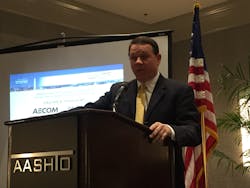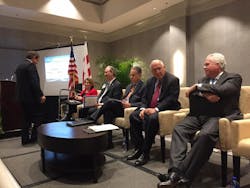WASHINGTON D.C. A vehicle miles traveled (VMT) tax “seems to be the lead possibility” in terms of constructing a national mechanism for replenishing the highway trust fund (HTF) going forward, according to Rep. Sam Graves (R-MO), chairman of the Hours of Representatives’ subcommittee on highways and transit.
“Everything is on the table” in terms of ways to generate more funds for transportation infrastructure needs, Graves explained during the American Assn. of State Highway and Transportation Officials (AASHTO) annual Washington Briefing meeting held here in the nation’s capital.
“We’re looking at more tolls – which I am not in favor of – and increasing fuel taxes along with a VMT tax,” he said. “There is some opposition in the House but a VMT tax is still the lead proposal. We should come to a decision [on funding mechanisms] in about a year.”
Though the Obama administration hasn’t supported VMT taxes in the past, the concept is being pilot tested by several states, especially Oregon, with more on the way due to federal funding.
The Mileage-Based User Fee Alliance (MBUFA) noted that Section 6020 of the FAST Act five-year highway bill signed into law last creates a $95 million grant program for further testing of mileage-based user fees in across the country.
The big question surrounding the VMT tax issue is whether it will replace fuel taxes or be added on top of them, largely because $70 billion of the just-passed $305 billion five-year highway bill came from the federal government’s general revenue fund.
“The concern is how to establish long-term stable funding,” noted Jeff Paniati, executive director and CEO of the Institute of Transportation Engineers (ITE), during a panel discussion following Graves’ remarks.
“There’s $70 billion of ‘pay-fors’ in the highway bill and we have to figure out how to fill that funding hole,” he said, pointing out that mileage fees are one way to account for alternatively fueled vehicles (AFVs) that don’t pay fuel taxes.Yet Peter Ruane, president and CEO of the American Road and Transportation Builders Assn. (ARTBA), second from the right in the photo at right, forcefully stressed that, regardless of the ultimate funding solution, more money for transportation infrastructure must be found.
“We’re grateful that the FAST Act got passed but we’re not grateful that we side-stepped the funding issue again – we’re relying on gimmicks” like the $70 billion general fund transfer, he said.
“We need a long-term, reliable and sustainable source of funding,” Ruane emphasized. “The job is not done – not even close. Let’s not kid ourselves; we cannot paper this over. We need more funding.”
He stressed that the one key to making the need for more funding palatable to the general public and to the political establishment in Washington D.C. is to become better “story tellers” about the transportation industry.
“We need to tell the story about the impact of transportation investments on our economy and our quality of life – and frankly, we’ve not done a good job on that,” Ruane said. “We are always moving on to the next project; we don’t stop to measure the benefits of our investments and explain it to the public. Because, if the public understands how transportation benefits them, the politicians will pay attention.”
About the Author
Sean Kilcarr
Editor in Chief
Sean Kilcarr is a former longtime FleetOwner senior editor who wrote for the publication from 2000 to 2018. He served as editor-in-chief from 2017 to 2018.

